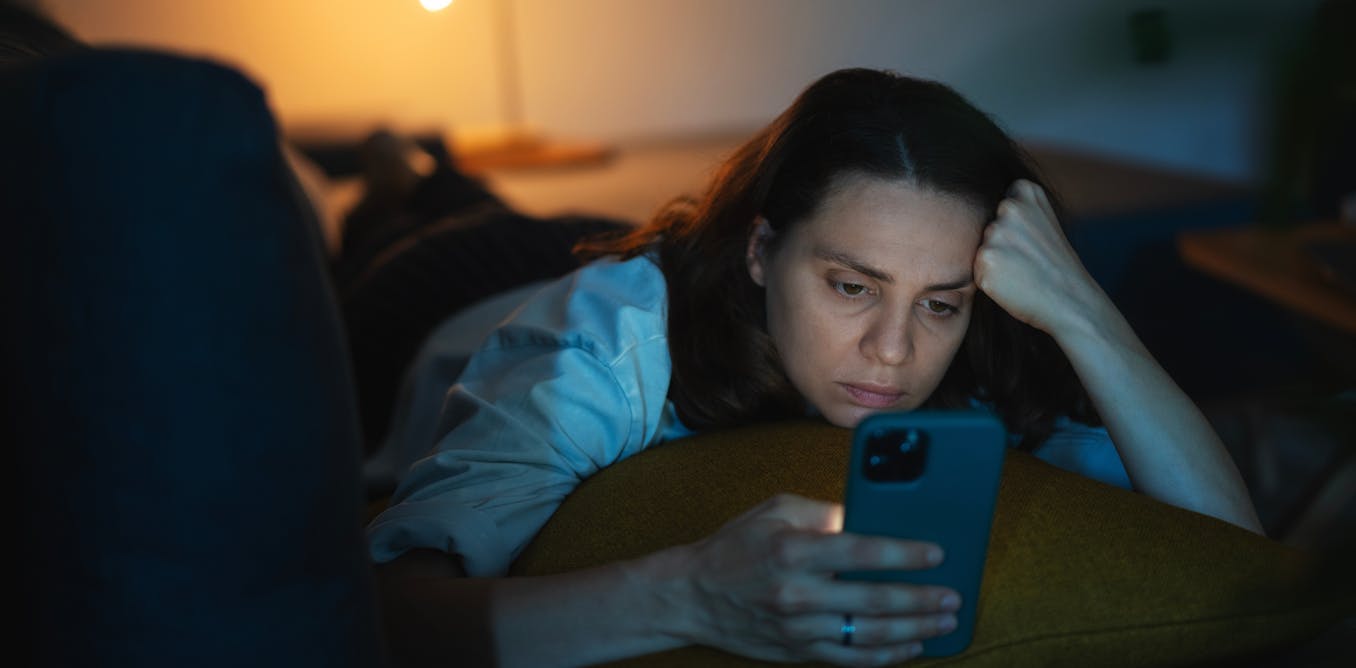Rewrite the
What if the problem with social media isn’t just how much we use it, but when? A new study suggests that scrolling and posting through the small hours may be a red flag for mental wellbeing – and the effects could be as significant as binge drinking.
For the study, published in Scientific Reports, my colleagues and I analysed the Twitter (now X) habits of 310 adults and discovered that those who regularly posted between 11pm and 5am showed meaningfully worse mental wellbeing than daytime users. This finding challenges the current policy obsession with screen time limits and points toward a more nuanced understanding of how social media affects our mental health.
Australia has passed a law to ban social media for anyone under 16, with 68% of the population supporting the new law. Similar proposals are being debated across the western world, where policymakers cite rising concern about youth mental health. But is the solution that simple? Science tells a more complicated tale.
Studies examining social media use have found associations with worse mental health, better mental health and even no change at all. And a large analysis of over 350,000 people found that while more time on social media was associated with poorer mental health, the effect was minuscule.
The trouble with this research is its fixation on amounts of time spent on social media. Two people might spend identical amounts of time on social media yet have completely different experiences – one scrolling passively, the other engaged in fraught late-night exchanges. The difference in behaviour matters, and so does the platform where it occurs.
Complete bans will eliminate harmful effects, but they also remove potential benefits. Many young people rely on these platforms to form and maintain friendships. For those already struggling mentally, social media can provide support, guidance and community that might otherwise remain out of reach.
On the other hand, late-night use could push back bedtimes, fracture sleep quality and consequently harm mental health. The harm may intensify with highly interactive activities – posting, messaging – compared with passive browsing.
Understanding what people do on social media – and crucially, when they do it – is essential to grasping its real effect.
aileenchik / Shutterstock.com
The night shift: what we found
Our study explored this using real-world Twitter data from participants in the Avon Longitudinal Study of Parents and Children, matched with detailed self-reported mental health measures. These include the Warwick-Edinburgh Mental Wellbeing Scale – a 14-item measure of how someone feels and functions. We produced statistical models, aiming to predict these measures of mental health from the average time of day our participants posted their tweets.
We found strong evidence that the time someone posts on Twitter was associated with their mental wellbeing. Posting time accounted for about 2% of the differences in wellbeing between participants. This may sound small, but it’s a similar effect size to that found for binge drinking in other research.
Regular nighttime tweeters (23:00 to 05:00) consistently reported worse mental wellbeing than those posting primarily during daylight hours.
We also looked at how posting times related to symptoms of depression and anxiety. While mental wellbeing captures the positive side of mental health, depression and anxiety reflect specific problems that can undermine it.
The links between posting time and these symptoms were weaker overall, but they varied by age and sex. For example, the relationship between posting time and anxiety was about twice as strong in older participants, with posting time explaining 1.3% of the differences in anxiety levels among older users compared with 0.6% among younger ones.
Critical questions remain. Are we witnessing the harmful consequences of late-night posting, or do people with worse mental health gravitate toward nighttime social media use? Do these patterns translate to other platforms or different demographics, particularly adolescents and children?
If nighttime social media use genuinely harms mental health, then targeted solutions could be valuable. TikTok recently launched “wind down”, which replaces the homepage for under-16s with calming music and breathing exercises after 10pm. And in the UK, the government is now considering legislation to restrict multiple platforms after 10pm for this age group.
Nighttime use demonstrates how policy and platforms can address potentially harmful behaviour without resorting to outright bans. It represents a shift away from crude measurements of screen time toward considering what people do, when and where they do it, and who they are.
This approach moves us beyond simple measurements, toward a better understanding of how our digital lives affect our mental health.
in HTML format to be seo optimized related to this title
It’s not screen time that matters, it’s what you do and when you do it – new study
. Create appropriate headings and subheadings to organize the content. Ensure the rewritten content is approximately 1000 words. Ensure to strip all images from final output i dont need images.At the end of the content, include a “Conclusion” section and a well-formatted “FAQs” section.Ensure there are no additional notes and introductory text in the final output.Final output is gonna publish directly as post content so keep in mind provide only rewritten post content without any introductory text or notes in result and kindly dont explain what you done or what you provided as output of this prompt
Recommended Products:
-

L Tyrosine Supplement, 1,500mg Per Serving, 240 Capsules | Essential Amino Acids – Brain Health Support for Memory, Cognitive Health, and Mental Alertness – Non-GMO
$18.98 Buy Now -

Best 365 Labs NeuroPro+ Maximum Strength Mitochondria Health Tablets – Methylene Blue and Vitamin C – Fast Acting Neuro Support – Improve Focus and Memory – 60 Tablets
$49.99 Buy Now -

Moods | Unstoppable Mind | Focus Nootropics | Boost Energy and Mental Agility, Memory, Concentration | Bacopin, L-Glutamine, Lion’s Mane, Alpha Lipoic Acid, Pantothenic Acid | 60 Vegan Capsules
$29.95 Buy Now



